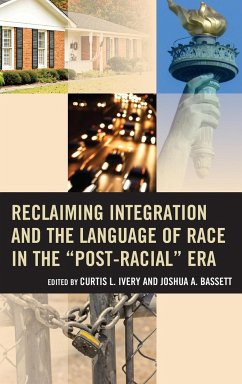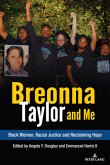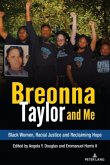Reclaiming Integration and the Language of Race in the "Post-Racial" Era
Herausgeber: Ivery, Curtis L.; Bassett, Joshua
Reclaiming Integration and the Language of Race in the "Post-Racial" Era
Herausgeber: Ivery, Curtis L.; Bassett, Joshua
- Gebundenes Buch
- Merkliste
- Auf die Merkliste
- Bewerten Bewerten
- Teilen
- Produkt teilen
- Produkterinnerung
- Produkterinnerung
The book is divided into two major sections: (1) "Reclaiming Integration"; (2) "Reclaiming the Language of Race." Both sections are located in the context of the "post-racial" era and analyzed by nationally renowned scholars in various dimensions.
Andere Kunden interessierten sich auch für
![Breonna Taylor and Me Breonna Taylor and Me]() Breonna Taylor and Me111,95 €
Breonna Taylor and Me111,95 €![Race to the Bottom: Reclaiming Antiracism Race to the Bottom: Reclaiming Antiracism]() Azfar ShafiRace to the Bottom: Reclaiming Antiracism17,99 €
Azfar ShafiRace to the Bottom: Reclaiming Antiracism17,99 €![Breonna Taylor and Me Breonna Taylor and Me]() Breonna Taylor and Me42,95 €
Breonna Taylor and Me42,95 €![Race in Post-racial Europe Race in Post-racial Europe]() Stefanie C. BoulilaRace in Post-racial Europe60,99 €
Stefanie C. BoulilaRace in Post-racial Europe60,99 €![Reclaiming Human Rights in a Changing World Order Reclaiming Human Rights in a Changing World Order]() Reclaiming Human Rights in a Changing World Order62,99 €
Reclaiming Human Rights in a Changing World Order62,99 €![Reclaiming Our Planet Reclaiming Our Planet]() Alexander GatesReclaiming Our Planet42,99 €
Alexander GatesReclaiming Our Planet42,99 €![A Bend in the River A Bend in the River]() V.S. NaipaulA Bend in the River19,99 €
V.S. NaipaulA Bend in the River19,99 €-
-
-
The book is divided into two major sections: (1) "Reclaiming Integration"; (2) "Reclaiming the Language of Race." Both sections are located in the context of the "post-racial" era and analyzed by nationally renowned scholars in various dimensions.
Hinweis: Dieser Artikel kann nur an eine deutsche Lieferadresse ausgeliefert werden.
Hinweis: Dieser Artikel kann nur an eine deutsche Lieferadresse ausgeliefert werden.
Produktdetails
- Produktdetails
- Verlag: Rowman & Littlefield
- Seitenzahl: 198
- Erscheinungstermin: 4. September 2015
- Englisch
- Abmessung: 235mm x 157mm x 15mm
- Gewicht: 450g
- ISBN-13: 9781475815184
- ISBN-10: 1475815182
- Artikelnr.: 42557942
- Herstellerkennzeichnung
- Libri GmbH
- Europaallee 1
- 36244 Bad Hersfeld
- gpsr@libri.de
- Verlag: Rowman & Littlefield
- Seitenzahl: 198
- Erscheinungstermin: 4. September 2015
- Englisch
- Abmessung: 235mm x 157mm x 15mm
- Gewicht: 450g
- ISBN-13: 9781475815184
- ISBN-10: 1475815182
- Artikelnr.: 42557942
- Herstellerkennzeichnung
- Libri GmbH
- Europaallee 1
- 36244 Bad Hersfeld
- gpsr@libri.de
Edited by Curtis L. Ivery and Joshua Bassett - Foreword by Eddie Glaude Jr. - Contributions by Maria Krysan; Howard Winant; John Powell; Andrew Grant Thomas; Gary Orfield; Erica Frankenberg; Reynolds Farley; Lucie Kalousova and Robert A. Sedler
Foreword-Eddie Glaude, Jr. Preface -Curtis L. Ivery Acknowledgements
CHAPTER ONE: Introduction and Theoretical Overview Curtis L. Ivery and
Joshua A. Bassett CHAPTER TWO: Are We Colorblind? A View from the
Neighborhood Maria Krysan, Professor of Sociology at the University of
Illinois at Chicago and the Institute of Government and Public Affairs
CHAPTER THREE: A Different Story: Race, Politics, and Radical Change Eddie
Glaude, Jr., William S. Tod, Professor of Religion and African American
Studies, Department of Religion, and Chair, Center for African American
Studies at Princeton University CHAPTER FOUR: The 1 Percent Needs Race to
Rule Howard Winant, Professor of Sociology; Founder and Director of the
University of California Center for New Racial Studies (UCCNRS) at
University of California, Santa Barbara CHAPTER FIVE: America's Struggle
with Integration: The Continued Struggle for its Soul John Powell,
Professor of Law; Professor of African American Studies and Ethnic Studies;
Robert D. Haas Chancellor's Chair in Equity and Inclusion; Director, Haas
Diversity Research Center (HDRC) CHAPTER SIX: Moving Beyond Race Fatigue:
Challenging Hidden Bias, Getting Serious About Our Racial Future Andrew
Grant Thomas, Director of Programs, Proteus Fund CHAPTER SEVEN:A Personal
Reflection: The Battle for Diversity on Campus: The Supreme Court, Civil
Rights Research and Affirmative Action in the 21st Century Gary Orfield,
Professor of Education, Law, Political Science and Urban Planning;
Co-Director of the Civil Rights Project/Proyecto Derechos Civiles at the
University of California, Los Angeles CHAPTER EIGHT: School integration in
the post-"Parents Involved" Era Erica Frankenberg, Assistant Professor in
the Department of Education Policy Studies in the College of Education at
the Pennsylvania State University CHAPTER NINE: The Future of Detroit: How
the City Got to Where It Is Now and What is Next Reynolds Farley, Otis
Dudley Duncan Professor of Sociology, Emeritus; Research Scientist,
Population Studies Center at the University of Michigan CHAPTER TEN: Racial
Disparities in Economic Well-Being in the Detroit Metropolitan Area after
the Great Recession Lucie Kalousova, doctoral candidate in Sociology and
Health Policy and a trainee in population studies at the University of
Michigan; and Sheldon Danziger, President, The Russell Sage Foundation;
Henry J. Meyer Distinguished University Professor of Public Policy at the
Gerald R. Ford School of Public Policy at the University of Michigan
CHAPTER ELEVEN: Integration and Equal Educational Opportunity in the
"Post-Racial" Era Robert A. Sedler, Distinguished Professor of Law, Wayne
State University Integration Resources
CHAPTER ONE: Introduction and Theoretical Overview Curtis L. Ivery and
Joshua A. Bassett CHAPTER TWO: Are We Colorblind? A View from the
Neighborhood Maria Krysan, Professor of Sociology at the University of
Illinois at Chicago and the Institute of Government and Public Affairs
CHAPTER THREE: A Different Story: Race, Politics, and Radical Change Eddie
Glaude, Jr., William S. Tod, Professor of Religion and African American
Studies, Department of Religion, and Chair, Center for African American
Studies at Princeton University CHAPTER FOUR: The 1 Percent Needs Race to
Rule Howard Winant, Professor of Sociology; Founder and Director of the
University of California Center for New Racial Studies (UCCNRS) at
University of California, Santa Barbara CHAPTER FIVE: America's Struggle
with Integration: The Continued Struggle for its Soul John Powell,
Professor of Law; Professor of African American Studies and Ethnic Studies;
Robert D. Haas Chancellor's Chair in Equity and Inclusion; Director, Haas
Diversity Research Center (HDRC) CHAPTER SIX: Moving Beyond Race Fatigue:
Challenging Hidden Bias, Getting Serious About Our Racial Future Andrew
Grant Thomas, Director of Programs, Proteus Fund CHAPTER SEVEN:A Personal
Reflection: The Battle for Diversity on Campus: The Supreme Court, Civil
Rights Research and Affirmative Action in the 21st Century Gary Orfield,
Professor of Education, Law, Political Science and Urban Planning;
Co-Director of the Civil Rights Project/Proyecto Derechos Civiles at the
University of California, Los Angeles CHAPTER EIGHT: School integration in
the post-"Parents Involved" Era Erica Frankenberg, Assistant Professor in
the Department of Education Policy Studies in the College of Education at
the Pennsylvania State University CHAPTER NINE: The Future of Detroit: How
the City Got to Where It Is Now and What is Next Reynolds Farley, Otis
Dudley Duncan Professor of Sociology, Emeritus; Research Scientist,
Population Studies Center at the University of Michigan CHAPTER TEN: Racial
Disparities in Economic Well-Being in the Detroit Metropolitan Area after
the Great Recession Lucie Kalousova, doctoral candidate in Sociology and
Health Policy and a trainee in population studies at the University of
Michigan; and Sheldon Danziger, President, The Russell Sage Foundation;
Henry J. Meyer Distinguished University Professor of Public Policy at the
Gerald R. Ford School of Public Policy at the University of Michigan
CHAPTER ELEVEN: Integration and Equal Educational Opportunity in the
"Post-Racial" Era Robert A. Sedler, Distinguished Professor of Law, Wayne
State University Integration Resources
Foreword-Eddie Glaude, Jr. Preface -Curtis L. Ivery Acknowledgements
CHAPTER ONE: Introduction and Theoretical Overview Curtis L. Ivery and
Joshua A. Bassett CHAPTER TWO: Are We Colorblind? A View from the
Neighborhood Maria Krysan, Professor of Sociology at the University of
Illinois at Chicago and the Institute of Government and Public Affairs
CHAPTER THREE: A Different Story: Race, Politics, and Radical Change Eddie
Glaude, Jr., William S. Tod, Professor of Religion and African American
Studies, Department of Religion, and Chair, Center for African American
Studies at Princeton University CHAPTER FOUR: The 1 Percent Needs Race to
Rule Howard Winant, Professor of Sociology; Founder and Director of the
University of California Center for New Racial Studies (UCCNRS) at
University of California, Santa Barbara CHAPTER FIVE: America's Struggle
with Integration: The Continued Struggle for its Soul John Powell,
Professor of Law; Professor of African American Studies and Ethnic Studies;
Robert D. Haas Chancellor's Chair in Equity and Inclusion; Director, Haas
Diversity Research Center (HDRC) CHAPTER SIX: Moving Beyond Race Fatigue:
Challenging Hidden Bias, Getting Serious About Our Racial Future Andrew
Grant Thomas, Director of Programs, Proteus Fund CHAPTER SEVEN:A Personal
Reflection: The Battle for Diversity on Campus: The Supreme Court, Civil
Rights Research and Affirmative Action in the 21st Century Gary Orfield,
Professor of Education, Law, Political Science and Urban Planning;
Co-Director of the Civil Rights Project/Proyecto Derechos Civiles at the
University of California, Los Angeles CHAPTER EIGHT: School integration in
the post-"Parents Involved" Era Erica Frankenberg, Assistant Professor in
the Department of Education Policy Studies in the College of Education at
the Pennsylvania State University CHAPTER NINE: The Future of Detroit: How
the City Got to Where It Is Now and What is Next Reynolds Farley, Otis
Dudley Duncan Professor of Sociology, Emeritus; Research Scientist,
Population Studies Center at the University of Michigan CHAPTER TEN: Racial
Disparities in Economic Well-Being in the Detroit Metropolitan Area after
the Great Recession Lucie Kalousova, doctoral candidate in Sociology and
Health Policy and a trainee in population studies at the University of
Michigan; and Sheldon Danziger, President, The Russell Sage Foundation;
Henry J. Meyer Distinguished University Professor of Public Policy at the
Gerald R. Ford School of Public Policy at the University of Michigan
CHAPTER ELEVEN: Integration and Equal Educational Opportunity in the
"Post-Racial" Era Robert A. Sedler, Distinguished Professor of Law, Wayne
State University Integration Resources
CHAPTER ONE: Introduction and Theoretical Overview Curtis L. Ivery and
Joshua A. Bassett CHAPTER TWO: Are We Colorblind? A View from the
Neighborhood Maria Krysan, Professor of Sociology at the University of
Illinois at Chicago and the Institute of Government and Public Affairs
CHAPTER THREE: A Different Story: Race, Politics, and Radical Change Eddie
Glaude, Jr., William S. Tod, Professor of Religion and African American
Studies, Department of Religion, and Chair, Center for African American
Studies at Princeton University CHAPTER FOUR: The 1 Percent Needs Race to
Rule Howard Winant, Professor of Sociology; Founder and Director of the
University of California Center for New Racial Studies (UCCNRS) at
University of California, Santa Barbara CHAPTER FIVE: America's Struggle
with Integration: The Continued Struggle for its Soul John Powell,
Professor of Law; Professor of African American Studies and Ethnic Studies;
Robert D. Haas Chancellor's Chair in Equity and Inclusion; Director, Haas
Diversity Research Center (HDRC) CHAPTER SIX: Moving Beyond Race Fatigue:
Challenging Hidden Bias, Getting Serious About Our Racial Future Andrew
Grant Thomas, Director of Programs, Proteus Fund CHAPTER SEVEN:A Personal
Reflection: The Battle for Diversity on Campus: The Supreme Court, Civil
Rights Research and Affirmative Action in the 21st Century Gary Orfield,
Professor of Education, Law, Political Science and Urban Planning;
Co-Director of the Civil Rights Project/Proyecto Derechos Civiles at the
University of California, Los Angeles CHAPTER EIGHT: School integration in
the post-"Parents Involved" Era Erica Frankenberg, Assistant Professor in
the Department of Education Policy Studies in the College of Education at
the Pennsylvania State University CHAPTER NINE: The Future of Detroit: How
the City Got to Where It Is Now and What is Next Reynolds Farley, Otis
Dudley Duncan Professor of Sociology, Emeritus; Research Scientist,
Population Studies Center at the University of Michigan CHAPTER TEN: Racial
Disparities in Economic Well-Being in the Detroit Metropolitan Area after
the Great Recession Lucie Kalousova, doctoral candidate in Sociology and
Health Policy and a trainee in population studies at the University of
Michigan; and Sheldon Danziger, President, The Russell Sage Foundation;
Henry J. Meyer Distinguished University Professor of Public Policy at the
Gerald R. Ford School of Public Policy at the University of Michigan
CHAPTER ELEVEN: Integration and Equal Educational Opportunity in the
"Post-Racial" Era Robert A. Sedler, Distinguished Professor of Law, Wayne
State University Integration Resources








